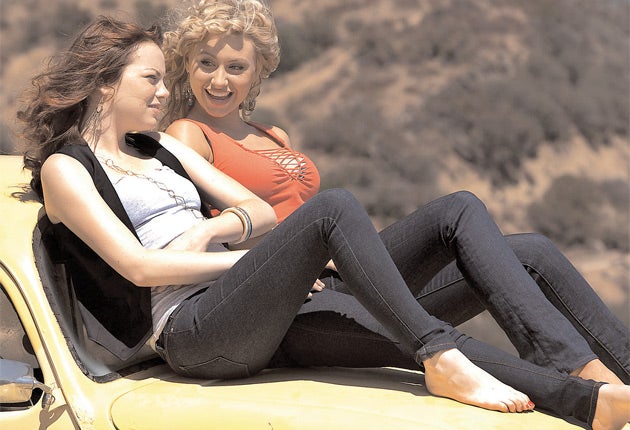Easy A (15)
Starring: Emma Stone, Amanda Bynes, Stanley Tucci, Patricia Clarkson, Malcolm McDowell, Lisa Kudrow

Remember when Amy Heckerling's Clueless came out in 1995, with its Californian mall-rat heroine Cher, interfering in the lives of friends and schoolteachers? How fresh it seemed, how sharp and rinsed its dialogue, how cleverly based on Austen's Emma. Remember Mean Girls in 2004, with Lindsay Lohan as 16-year-old Cady falling among a trio of bitches, among the cliques in a high school in Illinois? The rituals of American high-school life were hilariously explored again, this time by Tina Fey, with a nicely moral edge. Both were guilty pleasures for some grown-up cinephiles, and they announced that the US high-school movie was an interesting, adaptable genre that could accommodate serious subjects.
As though to confirm it, here's Easy A, a sparkling moral tale about a small lie that ramifies out of control. The screenwriter Bert Royal has shrewdly spotted two modern American trends among the young: a passion to gossip about and document every tiny detail of their lives, and a new wave of doctrinaire conventionalism about their behaviour. So when Olive Penderghast, an anonymous nobody at Ojai high school, California, is asked by her glamorous pal Rhiannon how she spent the weekend, she invents a boyfriend and the loss of her virginity that never happened. The lie is overheard by Marianne (Amanda Bynes) who runs the school's puritanical, Christian, anti-sex league. Before you can say "slut," the news has gone viral. Wherever she goes, Olive is stared at, as the Girl Who Actually Did It. The holier-than-thou brigade, taking time off from their Bible songs and get-her-expelled meetings, confront her. "There's a higher power that will judge you for your indecency," says sanctimonious Marianne. Olive looks shocked. "Tom Cruise?" she asks.
Olive is a caution. She's not exactly a beauty, but she has huge, pained and trusting eyes that radiate intelligence – and she's given some terrific dialogue to express that quality. When her beleaguered gay friend Brandon (Dan Byrd) begs her to pretend that they've had sex, and the pair retire to a room at a crowded party to enact a bogus performance, Brandon is appalled when she removes her red pants. "Jesus, what is with you gays?" says Olive. "Are you really that repulsed by lady parts? What do you think I have down there? A gnome?"
Saddled with the reputation of a harlot, a strumpet and a whore (sometimes you ask yourself – are we supposed to be in 2010 America here, or 1810 America?), Olive takes perverse solace from the book her peers are studying in English with her favourite teacher, Mr Griffith (Thomas Haden Church). It's The Scarlet Letter by Nathaniel Hawthorne, about the tragic figure of Hester Prynne, who has a baby with a clergyman and is forced to wear the red letter "A" (for adultery) sewn on to her clothing.
Olive is still sexually unbesmirched, but the thought of attention appeals to her. Knowing that strangers are making up stories about her sexual escapades, she sews a red-satin "A" on her corset and embraces a newly brazen persona. "Who is that?" asks Mrs Griffith (Lisa Kudrow), the school's sympathetic ear. "I'm the guidance counsellor. I should know all the students, especially the ones that dress like prostitutes."
More and more boys queue up, not to date Olive, but to offer her money in exchange for giving them a reputation as one of her sexual partners. She reluctantly accepts shop vouchers and mini-mart discounts, and watches as the price of a fictional shag (the value of her virtual virtue) goes down and down. Then a good-looking boy takes her on a date and offers her $200 for the real thing. From being a cynical watcher of the rumour factory, an exploiter of male braggadocio, she's now being seen as a whore. And when a key figure in the school is diagnosed with a social disease, guess who is blamed? And guess how she fights back?
Easy A is an admirable movie because, along with all the smart lines, it offers a strong idea, logically worked out. It's about how far you go to establish a value for yourself (or a "profile" in Facebook and Twitter country), before deciding that some things are nobody's goddammed business but yours. It's also a movie with a heart. We see where Olive gets her confidence from when we meet her parents, played by Stanley Tucci and Patricia Clarkson. Their conversations with Olive and her adopted, black brother are effortlessly funny, charming and mildly shocking in their lack of hysteria or leaps to judgement. They're the warm heart of a film about public rejection and private empowerment that never sentimentalises or preaches. And that gives us, in Emma Stone's multi-layered performance, the new Lindsay Lohan. I hope she lasts longer than her predecessor.
Join our commenting forum
Join thought-provoking conversations, follow other Independent readers and see their replies
Comments
Bookmark popover
Removed from bookmarks